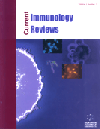-
s Autoimmune Hepatitis: Pathophysiology, Diagnosis and Pharmacological Therapy
- Source: Current Immunology Reviews (Discontinued), Volume 8, Issue 4, Nov 2012, p. 268 - 274
-
- 01 Nov 2012
Abstract
Autoimmune hepatitis (AIH) is a chronic inflammatory liver disease, rare and of unknown etiology, that affects patients who lack tolerance to self antigens. Genetic and environmental factors are related to the disease etiology. The pathology, mainly prevalent in females, is characterized by the presence of interface hepatitis with biochemical changes, such as increased levels of transaminase, the presence of hypergammaglobulinemia and circulating autoantibodies. Antibodies classify the types of the disease. Due to the heterogeneity of symptoms, the diagnostic criteria are not unique since they are based on a combination of clinical, biochemical, immunological and histological features. AIH should be diagnosed in its early stages due to possible cirrhosis evolution when untreated. Standard and most effective treatment consists of corticosteroids in combination or not with azathioprine. AIH has a good prognosis with good resolution of symptoms when properly treated, albeit with relapse at an early withdrawal.


